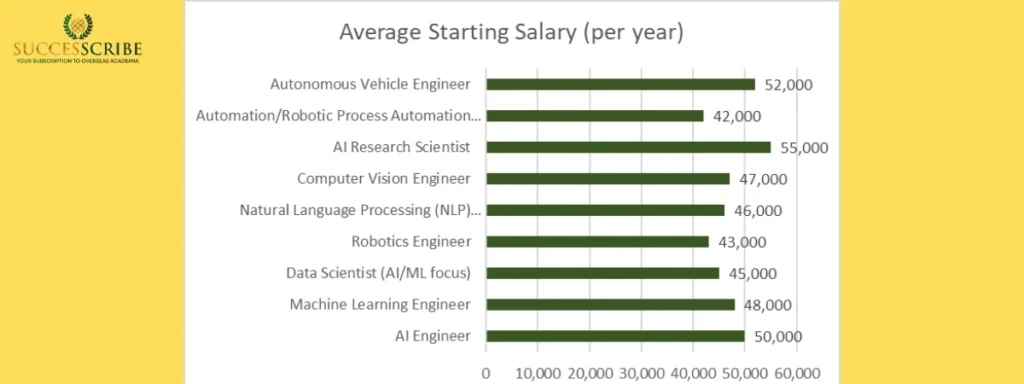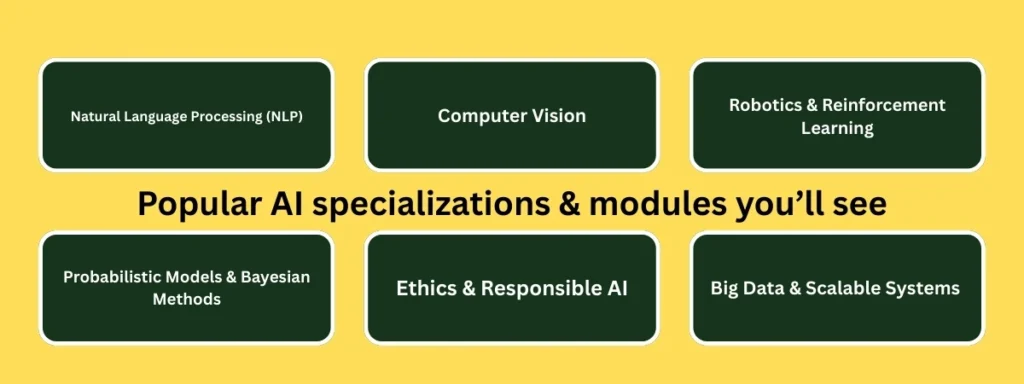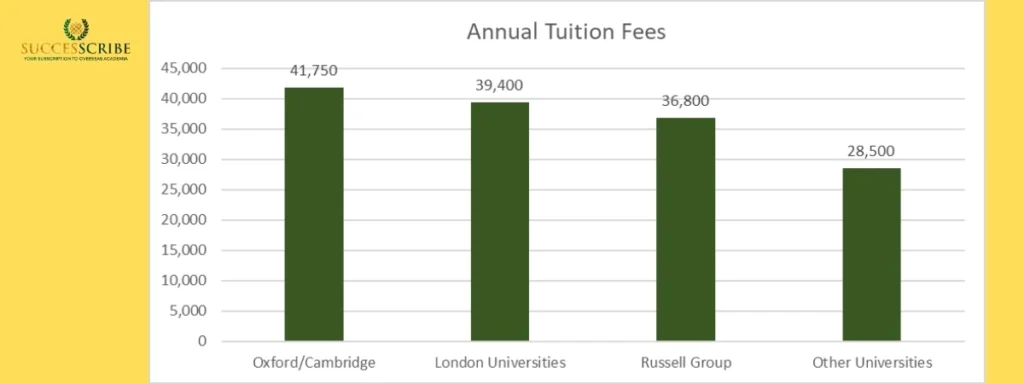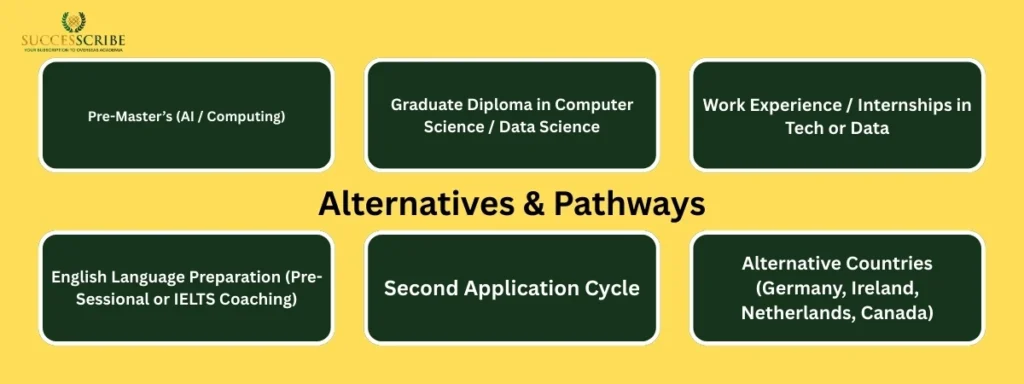Artificial Intelligence (AI) is transforming industries worldwide, from healthcare and finance to robotics and autonomous vehicles. The UK AI sector is expected to add over £200 billion to the economy by 2040, making it one of the most exciting destinations to study this field. With top-ranked universities like Oxford, Cambridge, Imperial, and UCL, the UK is at the forefront of AI research, supported by institutions such as the Alan Turing Institute in collaboration with global tech leaders like Google DeepMind and Microsoft. A Masters in Artificial Intelligence in UK typically takes just one year full-time, offering a faster and more cost-effective route compared to many countries. Tuition fees for international students range from £20,000–£35,000, while AI professionals in the UK earn an average of £55,000–£75,000 annually.
Why the UK is a Premier Destination for AI Studies
The UK’s AI ecosystem is thriving, supported by government initiatives like the AI Sector Deal, which aims to invest £1 billion in AI by 2025. UK universities emphasize practical, research-oriented learning, often collaborating with tech giants such as Google DeepMind and Microsoft. Graduates benefit from the Graduate Route visa, which allows them to stay and work in the UK for up to two years after completing their studies. In 2025, AI job vacancies in the UK are projected to grow by 20%, with roles in machine learning and data science leading the charge. With world-class universities and strong industry ties, a Masters in Artificial Intelligence in UK equips students with both theoretical knowledge and practical skills.
- World-Class Research: UK universities lead in AI publications, with over 15,000 AI-related papers published annually.
- Industry Links: Programs often include internships with companies like IBM and NVIDIA.
- Diverse Specializations: From ethical AI to robotics, options cater to varied interests.
- Global Recognition: Degrees from UK institutions rank highly in employability, with 85% of AI graduates finding jobs within six months.
In 2025, enrollment in AI Master’s programs has increased by 15% year-over-year, reflecting the field’s growth.
Top Universities for Masters in Artificial Intelligence in UK
Rankings and tuition evolve annually. Leading institutions like Oxford, Cambridge, and Imperial make a Masters in Artificial Intelligence in UK one of the most prestigious qualifications worldwide.
| University (example programme) | Typical International Tuition (approx, full-time MSc, GBP) | Global CS/AI Subject Rank (QS/THE range) |
| University of Edinburgh – MSc Artificial Intelligence | £28,000 – £39,000 (varies by programme) | Top 10–30 globally in CS/AI. |
| UCL – MSc Machine Learning / AI | £30,000 – £40,000 | Top 20–40 |
| University of Oxford – MSc in Advanced Computer Science (AI Focus) | £35,000 – £45,000 | Top 10 |
| Imperial College London – MSc AI related | £33,000 – £45,000 | Top 10–30 |
| University of Cambridge – MPhil in Machine Learning, Speech & Language Tech | £40,000+ | Top 5–10 |
| King’s College London – MSc Artificial Intelligence | £20,000 – £35,000 (varies) | Top 30–60 |
| University of Southampton – MSc Artificial Intelligence | £22,000 – £30,000 | Top 50–100 |
| University of Surrey – MSc Computer Vision, Robotics & ML | £20,000 – £28,000 | Top 100 |
| Lancaster, Manchester, Warwick, Bristol – strong AI modules | £18,000 – £30,000 | Top 50–100 |
Admission Requirements for MSc AI Programs in the UK
Admission to UK MSc AI programs is competitive, with acceptance rates averaging 20-30% in top universities. General requirements include:
- Academic Qualifications: A minimum 2:1 (upper second-class) UK Bachelor’s degree or equivalent (GPA 3.0/4.0) in computer science, mathematics, engineering, or a related field. For example, Imperial College requires a First-Class Honours in a quantitative subject. Non-STEM applicants may need bridging courses.
- GPA/Percentage Equivalents: International students need a GPA of 3.0/4.0 (US) or 70-75% (India/China). Edinburgh specifies a 2:1 in a numerate discipline.
- Programming Skills: Proficiency in languages like Python, Java, or C++. UCL mandates evidence of software development experience.
- Mathematics Background: Strong knowledge in calculus, linear algebra, and statistics. King’s College specifies familiarity with trigonometry and probability.
- English Language Proficiency: IELTS 6.5-7.0 overall (no band below 6.0), or TOEFL 100+. Edinburgh requires IELTS 7.0
- Supporting Documents: CV, personal statement (500-1000 words on AI interests), two academic references, and sometimes GRE scores.
- Work Experience: Preferred but not mandatory; 1-2 years in tech boosts applications at Sheffield.
International students from India or China often need to meet ATAS (Academic Technology Approval Scheme) for AI programs involving sensitive tech. Highlight projects like Kaggle competitions; early applications boost chances.
Who should apply? – Ideal candidate profile
- A strong quantitative undergraduate degree (Computer Science, Mathematics, Statistics, Engineering, Physics) – or equivalent industrial experience plus conversion coursework.
- Programming ability (Python, ML libraries: PyTorch, TensorFlow, scikit-learn).
- Understanding of core ML topics: linear algebra, probability, optimization, algorithms.
- Motivation for applied or research AI (industry placement or PhD progression).
- For some courses, prior ML/AI modules and research/project experience strengthen applications.
UK intake seasons & timeline
- Main intake: September / October – most programmes.
- Secondary intakes: January / February (limited programmes).
- Application windows: Many universities open applications 6–12 months before the September intake; deadlines vary – competitive programmes close earlier (some by June/July). Apply early and confirm exact deadlines on university pages.
UK Student Visa Requirements
International students need a Student visa (Tier 4) for MSc programs. Key requirements for 2025:
- Confirmation of Acceptance for Studies (CAS): Issued by the university after offer acceptance.
- Financial Proof: £1,483/month for London (up to 9 months) or £1,136/month outside; plus fees.
- English Proficiency: As per university requirements.
- Tuberculosis Test: For certain nationalities.
- ATAS Certificate: Required for AI programs.gov.uk
- Biometrics and eVisa: From January 2025, all applicants must register for an eVisa.
Visa fee: £490. Processing time: 3 weeks. Post-2025 changes include stricter financial criteria.
Career Prospects and Salary Expectations

The demand for AI talent in the UK far outstrips supply, making graduates highly employable with attractive salary packages. Graduates holding a Masters in Artificial Intelligence in UK earn salaries ranging from £55,000 to £75,000, with senior roles exceeding £100,000.
Potential Job Roles
- Machine Learning Engineer
- Data Scientist
- Research Scientist (AI)
- Computer Vision Engineer
- Natural Language Processing (NLP) Engineer
- AI Software Developer
- Robotics Engineer
- AI Consultant
- AI Ethicist
Key Employers
A Masters in Artificial Intelligence in UK is highly valued by employers across Europe, North America, and Asia.
- Tech Giants: Google DeepMind, Amazon, Microsoft, Apple, Meta, IBM, NVIDIA.
- Finance: JP Morgan, Barclays, Goldman Sachs, Bloomberg, Mastercard.
- Consulting: Accenture, Deloitte, PwC, KPMG, BCG Gamma.
- Start-ups & Scale-ups: Hundreds of AI-focused companies across London, Cambridge, and Edinburgh.
- Healthcare & Pharma: AstraZeneca, GSK, NHS AI Lab.
Salary Expectations after Masters in Artificial Intelligence in UK
| Job Role | Average Starting Salary (per year) | Experienced Salary Range (per year) | Industry Demand |
| AI Engineer | £42,000 – £50,000 | £65,000 – £90,000 | Very High (Tech, Healthcare, Finance) |
| Machine Learning Engineer | £40,000 – £48,000 | £60,000 – £85,000 | High |
| Data Scientist (AI/ML focus) | £38,000 – £45,000 | £55,000 – £80,000 | Very High |
| Robotics Engineer | £37,000 – £43,000 | £55,000 – £75,000 | Growing |
| Natural Language Processing (NLP) Specialist | £39,000 – £46,000 | £60,000 – £82,000 | High |
| Computer Vision Engineer | £40,000 – £47,000 | £58,000 – £78,000 | High |
| AI Research Scientist | £45,000 – £55,000 | £70,000 – £95,000 | Very High (Academia & Industry) |
| Automation/Robotic Process Automation Specialist | £36,000 – £42,000 | £52,000 – £70,000 | Medium to High |
| Autonomous Vehicle Engineer | £43,000 – £52,000 | £65,000 – £90,000 | Emerging but Rapidly Growing |
Decoding the Programs: MSc vs. MEng and Specializations
A Master’s in AI in the UK typically takes one calendar year (12 months) of full-time study, though part-time options (24-36 months) are also available at many institutions.
- MSc (Master of Science)
This is the most common type of AI Master’s. It is typically designed for students who have completed a Bachelor’s degree in a related field (e.g., Computer Science, Mathematics, Engineering) and wish to specialize. The structure usually involves:
- Taught Modules (Semesters 1 & 2): Approximately 8-10 modules covering core and elective topics.
- Research Dissertation (Summer): A significant individual research project, often spanning 3-4 months, which allows for deep specialization.
- MEng (Master of Engineering)
This is often an integrated undergraduate-master’s program (4 years in the UK). However, some universities offer a standalone MEng at a postgraduate level, which may have a stronger focus on the practical engineering and systems-building aspects of AI compared to the more theoretical MSc.
Course Structure and Curriculum

The global recognition of a Masters in Artificial Intelligence in UK ensures excellent return on investment for international graduates. Most MSc AI programs in the UK last 12 months full-time, divided into taught modules (60-80% of credits) and a dissertation (20-40%). Total credits: 180 (UK system). Curricula blend theory, practice, and ethics, aligning with EU AI Act standards.
Typical modules include:
- Core: Machine Learning, Deep Learning, Data Mining, AI Ethics.
- Electives: Natural Language Processing (NLP), Computer Vision, Robotics, Big Data Analytics.
- Practical Components: Group projects, labs using tools like TensorFlow and PyTorch.
Popular AI specializations & modules you’ll see
Machine Learning & Deep Learning (supervised, unsupervised, neural networks, optimization).
- Natural Language Processing (NLP) – text representation, transformers, speech tech.
- Computer Vision – convolutional models, object detection, image segmentation.
- Robotics & Reinforcement Learning – control, RL algorithms, simulation-to-real.
- Probabilistic Models & Bayesian Methods – uncertainty modelling.
- Ethics & Responsible AI – fairness, explainability, regulation.
- Big Data & Scalable Systems – distributed ML, model deployment.
- Capstone/Dissertation – applied project (often industry-linked) or research thesis.
Tuition Fees – Masters in Artificial Intelligence in UK

The total tuition fees for MSc in AI in UK widely varies between £18,600 and £41,750 across the top universities, representing significant variation based on university prestige and location.
UK/Home Students Fees
| University Tier | Annual Tuition Fees |
| Oxford/Cambridge | £12,000 – £15,500 |
| London Universities | £11,500 – £14,000 |
| Russell Group | £10,500 – £13,500 |
| Other Universities | £9,500 – £12,000 |
International Students Fees
| University Tier | Annual Tuition Fees |
| Oxford/Cambridge | £40,500 – £41,750 |
| London Universities | £33,450 – £39,400 |
| Russell Group | £29,950 – £36,800 |
| Other Universities | £22,300 – £28,500 |
Cost of Living in the UK for Students
UKVI requires proof of £1,483/month (London) or £1,136 (elsewhere) for 9 months.
| Category | London (£) | Outside London (£) |
| Accommodation | 800-1,200 | 500-800 |
| Food | 200-300 | 150-250 |
| Transport | 100-150 | 50-100 |
| Utilities/Internet | 50-100 | 40-80 |
| Miscellaneous (entertainment, health) | 100-200 | 80-150 |
| Total Monthly | 1,250-1,950 | 820-1,380 |
Scholarships, Funding & Assistantships – Masters in AI in UK
Studying a Master’s in Artificial Intelligence in the UK can be a significant financial investment, but students have access to a wide range of scholarships, funding schemes, and assistantships that can help reduce the cost burden. These opportunities are offered by the UK government, universities, and external organizations, and they aim to support academic excellence, diversity, and equal access to higher education.
Most AI and Data Science funding initiatives in the UK fall into three categories:
- Government-Funded Scholarships – These include prestigious awards like the Chevening Scholarships, which are fully funded and cover tuition, living expenses, and travel costs. Some state-level collaborations, such as the Uttar Pradesh–Chevening Scholarship, also provide generous funding packages for international students.
- University-Specific Scholarships – Many universities (such as Birmingham, Sussex, Kent, and Nottingham Trent) offer £10,000 scholarships for AI and Data Science programmes, especially targeting students from under-represented groups including women, ethnic minorities, low-income backgrounds, and individuals with disabilities.
- Assistantships & Departmental Funding – While research assistantships are more common in PhD programmes, some UK universities offer teaching or research support roles at the postgraduate level. These roles not only provide financial support (usually in the form of stipends or tuition fee reductions) but also give students valuable academic experience.
| Type of Funding | Typical Value | Who Can Apply | Covers |
| Government Scholarships (Chevening, GREAT, Commonwealth) | Fully funded (£30,000 – £60,000) | High-achieving international students with leadership potential | Tuition, living expenses, travel, visa fees |
| AI & Data Science Conversion Scholarships (Birmingham, Sussex, Kent, NTU) | £10,000 | UK/home students from under-represented groups | Tuition or maintenance support |
| University Merit Scholarships | £3,000 – £10,000 | International students with outstanding academic records | Tuition fee reduction |
| Assistantships / Research Roles | £5,000 – £15,000 (varies) | Selected postgraduate students | Partial tuition fee waivers or stipends |
Alternatives & Pathways (If You Don’t Get Admitted Immediately)

Not every student secures admission to a Master’s in Artificial Intelligence in the UK on their first attempt. The good news is that there are several alternative routes and preparatory pathways that can strengthen your profile and improve your chances in the next application cycle. These options also help build valuable skills and academic readiness.
| Alternative Pathway | Description | Duration / Cost Range | Benefit for Future Admission |
| Pre-Master’s (AI / Computing) | Offered by many UK universities for students who don’t directly meet entry requirements. Focus on academic writing, programming, and research skills. | 6–12 months; £8,000 – £15,000 | Bridges academic gaps and provides direct progression to MSc once completed. |
| Graduate Diploma in Computer Science / Data Science | Conversion courses designed for students from non-CS backgrounds. | 9–12 months; £9,000 – £18,000 | Builds technical foundation in programming, databases, and AI fundamentals. |
| Work Experience / Internships in Tech or Data | Gain hands-on experience in roles like Data Analyst, Software Developer, or ML Engineer. | 6–24 months (paid positions) | Shows practical skills, improves CV, and can offset weaker academic grades. |
| English Language Preparation (Pre-Sessional or IELTS Coaching) | For students who fall short of language requirements (IELTS 6.0–6.5 usually needed). | 8–20 weeks; £3,000 – £6,000 | Helps meet English proficiency requirements for admission. |
| Second Application Cycle | Reapply the following year with improved scores, stronger documents, or better references. | 1 year gap | Gives time to refine SOP, gain experience, and target more universities. |
| Alternative Countries (Germany, Ireland, Netherlands, Canada) | Explore AI/CS master’s programmes in countries with strong tech industries. | 1–2 years; often lower tuition than the UK | Provides global options while keeping AI as your focus. |
Conclusion
A Masters in Artificial Intelligence in UK is more than a degree, it’s a fast-track to joining one of the world’s most innovative industries. With top-ranked universities, strong industry links, and post-study work opportunities, the UK offers the perfect blend of world-class education and career growth. For ambitious students, it’s not just study abroad, it’s a launchpad to the future of AI.
FAQs
Why should I choose a Masters in Artificial Intelligence in UK?
Because UK universities offer one-year programs, world-class research facilities, and strong career opportunities in AI and related fields.
What is the duration of a Masters in Artificial Intelligence in UK?
Most AI master’s programs in the UK are 1 year full-time, but some universities also offer 2-year options with internships.
What is the cost of studying a Masters in Artificial Intelligence in UK?
Tuition fees typically range between £20,000 – £35,000 per year, depending on the university and course structure.
Is IELTS mandatory for Masters in Artificial Intelligence in UK?
Yes, most universities require IELTS/TOEFL, but some may waive it if your prior education was in English.
What jobs can I get after a Masters in Artificial Intelligence in UK?
Graduates can work as AI Engineers, Data Scientists, Machine Learning Specialists, Robotics Engineers, and Research Scientists.
Related Post
MSc robotics in UK
Top universities for mba in UK
Executive mba in UK
One year mba in UK fees















